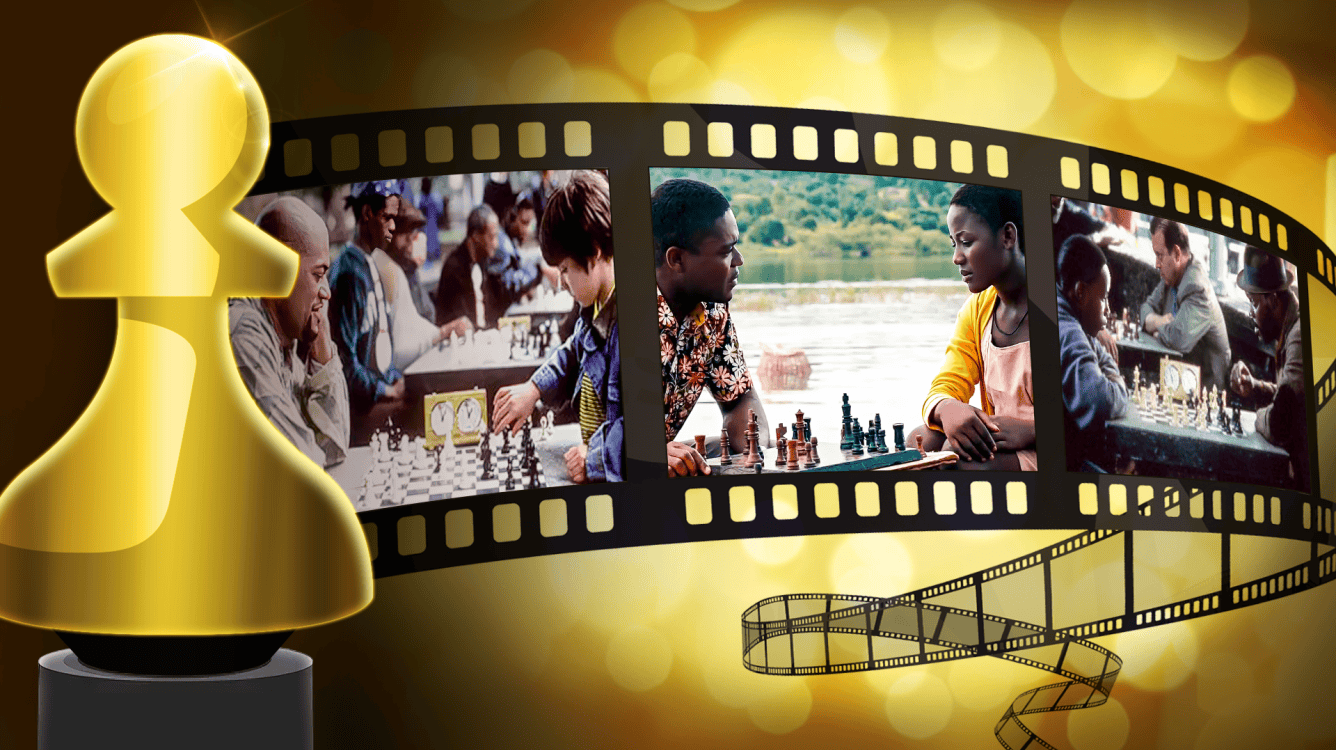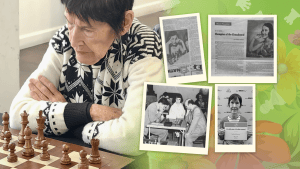
The 7 Best Chess Movie Scenes
I still remember my childhood evenings, watching Searching for Bobby Fischer over and over, the script becoming nearly a manual for my chess pursuits. Even in the mornings before venturing to my earliest scholastic tournaments, I found inspiration and drive from watching the documentary Chess Kids. Geri's Game was another quick, fun favorite I'd return to. Chess combined with media not only entertains us but can deepen our love for the game itself.
How many scenes have you encountered where the protagonists' genius is affirmed by their patient evaluation of a chess position, or perhaps it is a romantic gesture between two cerebrally-entangled lovers? Chess is the pawn metamorphosing into any narrative a film desires at the end of a board.
Below is a list (in no particular order) of some of the most impactful and critically-acclaimed chess films of the last five decades. These selections represent a range of scenes and perspectives that will hopefully invite you to dive into the rich cinematic world of chess.
- Searching for Bobby Fischer
- The Luzhin Defense
- Queen of Katwe
- Dangerous Moves
- Harry Potter and the Sorcerer's Stone
- Fresh
- The Queen's Gambit
1. Searching for Bobby Fischer (1993)
Based on the true story of former prodigy IM Josh Waitzkin, this riveting film follows the journey of a kid with a unique ability for chess, almost as if the ghost of a former champion had whispered in his palms as he moved a piece. After the boy’s talent is unearthed and acknowledged, he’s tasked with the complicated burden of sustaining his passion for the game while satisfying the expectations of his father, as well as his coach, Bruce Pandolfini.

Josh’s gift is first discovered by a player in Washington Square Park, Vinnie, who he plays blitz and banters through the hours with. The most inspirational scene surfaces near the end of the movie, after Josh’s relationship with his coach has become strained and he seeks his old sparring partner to reignite his inner fire before a youth championship tournament he’s prepared so long for. Vinnie’s wisdom illuminates the idea that to achieve the height of our passionate pursuits “You got to risk losing. You gotta risk everything.”
You got to risk losing. You gotta risk everything.
I’m conflicted with who the title, "Searching for Bobby Fischer" was intended for. Was it for Josh, who’s chasing the shadow of a giant like Fischer, or are his father and coach truly the ones obsessed with finding the disappeared champion in the shadow of a boy?
This film is an adaptation of the classic book The Defense by Vladimir Nabokov. The main character, Aleksandr Ivanovich Luzhin, is a prodigy who grows into a world-class player with eccentricities that make him unique both on and off the board.

The scene in question is the game against his main adversary. We get to witness the mind of a player when there's limited time and everything to lose.
As the clock ticks down, Aleksandr begins to hallucinate the vision of his father, who relinquished him to a man who would act as his guardian and sponsor as he pursued chess throughout his life. With no other skills, Aleksandr was completely devoted to chess and dependent on his guardian, who turned out to be exploitative, eventually abandoning him in the fog of an unknown city because he lost a game to an amateur at a bar. We learn that the pressures of our past can be the ghosts that walk in our wake.

All of this accumulated into a condensed memory represented as the hallucination of his father sitting across from him, staring in judgment, before the flag of the chess clock falls.
This film is based on the true story of Phiona Mutesi from Katwe, an area in Kampala, the capital of Uganda. The narrative focuses on how Phiona is able to use her infatuation for chess as a path out of the poverty she was born into. Her community and mother are enthusiastic about having a child represent a place so many would overlook. Her mother wants the best for her and sees chess not as a precipice but the door to better opportunities. Phiona, however, seeks to improve and gain a deeper understanding of the game she loves.

I’m particularly interested in the moment she comes home with a huge trophy only to endure a flood in later scenes. It is a “calm before the storm” moment where Phiona ruminates on the question of what success in chess looks like if her well-being is still in jeopardy. “Coach, you told us to make a plan for when the rains come,” Phiona narrates as the water crashes through her home.

“But how can I plan when there is no roof, when there are no walls?” As rain replaces the ground beneath, the audience learns that “talent” can easily be lost to war, lack of resources, or even natural disasters communities are not sufficiently prepared for. “The water does not care about my plan,” Phiona laments. “The water takes anything it wants.”
The water does not care about my plan. The water takes anything it wants.
This movie captures the story of two grandmasters battling for the world championship title. It manages to incorporate a few hidden references to the Karpov-Korchnoi match of 1978 and Bobby Fischer's disposition in his match in '72. As the rounds progress, we witness two men willing to do anything to overcome their opposition.
Below, we arrive at a scene near the end of the film where one of the competitors, Akiva Liebskind, is suffering from an illness and, despite his friend and personal doctor's suggestion, he is still focused entirely on defeating Pavius Fromm and winning the match. He goes as far as to say: "Don't be a fool! I'm not interested whether I drop dead or get well. I want to beat him. That's all."

I'm not interested whether I drop dead or get well. I want to beat him.
Many of us can relate to when our passion falls prey to our blinding hatred for another. How far are we willing to go, becomes the question. "It is my life and it is my carcass!!" Akiva continues, as his doctor lays him down to rest.
5. Harry Potter and the Sorcerer’s Stone (2001)
Let’s not forget the film that introduced us to the variant of wizard’s chess. While this is the only film where the plot is not entirely threaded together by the needle of chess, the game is used as a creative turning point that leads to the ultimate showdown between Harry Potter and He-Who-Shall-Not-Be-Forked-With.

The power of friendship is strong with the dynamic trio of Harry, Ron, and Hermoine. Ron, the chess expert among them, uses his strategic knowledge to battle an enchanted army coordinated behind-the-scenes by none other than the late IM Jeremy Silman, a legend in chess literature. The mating combination provides solid momentum to the moment Ron sacrifices himself for Harry to continue on his perilous journey.

The beautifully-made set creates a believable atmosphere full of magic and cerebral effects that both seasoned chess players and magicians would equally be spellbound by.
In this next classic, we enter New York City in the early 90s where the main character Fresh is unfortunately running drugs for dealers who constantly envision him as their eventual successor. The story is a tragic one of a boy surrounded by deaths he narrowly escapes while setting an elaborate plan to save his sister from the same dealers he works for. We watch Fresh periodically daydream about a train, the machinery of redemption we might assume would lead him away from the tracks of his own demise.

Fresh often visits his father he's not supposed to see; a blitz specialist who may well be a master given his fond memories of playing legendary opposition. His father plays primarily in Washington Square Park since leaving rehab, earning the company of money from local challenges. However, he's really waiting for the challenging company of his son, Fresh, where chess represents the only lasting bridge between them. The game, in these scenes, acts as an adjournment from the dangerous world Fresh endures.

We see Fresh’s father teach him strategies comparable to unfiltered life lessons. What follows is a series of events that involves Fresh maneuvering through the grasps of police and drug dealers like tactical complications. The question becomes: if we apply the strategies of this game to the real world, what (or who) are we actually training ourselves to sacrifice?
Ok, you don’t have to swarm the comments saying how The Queen's Gambit is actually a mini-series. Let’s pretend this is a seven-hour movie with intermissions.
Beth Harmon is a chess genius who discovers the game from her orphanage’s janitor. Along with other disturbances that visit her life, chess is the one thing her mind can safely circle back to when she is not battling drug and alcohol addiction. By the 1960s she becomes one of the top players in the nation, and is eventually invited to the Moscow Invitational, where she faces a fearsome series of players to attain international glory.

After a long, internal struggle with memory, addiction, and solitude, we see her fully in control and present in both mind and body. Chess was a way to run away from her problems and now it's being used to face them head-on. In these scenes we encounter a woman who does away with the fear of herself that she once masked as indifference. The power she exudes with every move is admirable, and if you've watched every episode up to this moment, you'll have learned about the thin line between being ruined by your obsession or strengthened by it.

Which chess movies or scenes made an impact on you?



